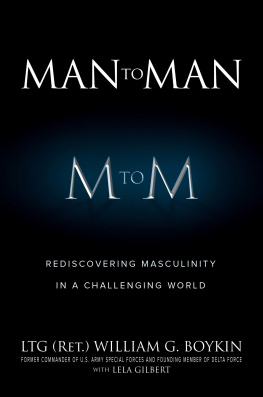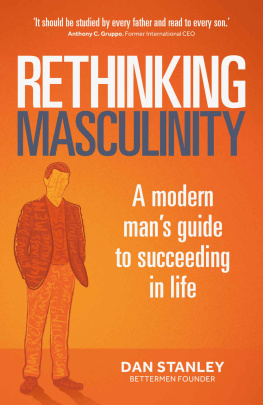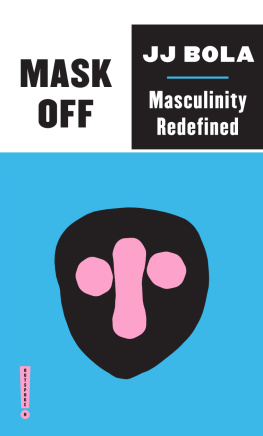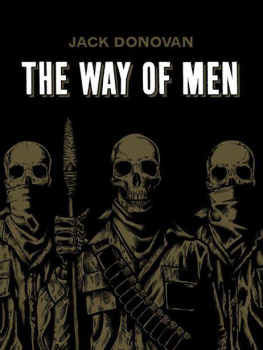

MAN UP
JACK URWIN
SURVIVING MODERN MASCULINITY
MAN UP

Published in the UK in 2016
by Icon Books Ltd, Omnibus Business Centre,
3941 North Road, London N7 9DP
email: info@iconbooks.com
www.iconbooks.com
Sold in the UK, Europe and Asia
by Faber & Faber Ltd, Bloomsbury House,
7477 Great Russell Street,
London WC1B 3DA or their agents
Distributed in the UK, Europe and Asia
by Grantham Book Services,
Trent Road, Grantham NG31 7XQ
Distributed in Australia and New Zealand
by Allen & Unwin Pty Ltd,
PO Box 8500, 83 Alexander Street,
Crows Nest, NSW 2065
Distributed in South Africa
by Jonathan Ball, Office B4, The District,
41 Sir Lowry Road, Woodstock 7925
Distributed in India
by Penguin Books India,
7th Floor, Infinity Tower C, DLF Cyber City,
Gurgaon 122002, Haryana
ISBN: 978-178578-069-1
Text copyright 2016 Jack Urwin
The author has asserted his moral rights.
No part of this book may be reproduced in any form, or by any means, without prior permission in writing from the publisher.
Typeset in DIN by Marie Doherty
Printed and bound in the UK by Clays Ltd, St Ives plc
Contents
What Makes a Man?
Boys Dont Cry: Childhood, Social Conditioning and Mental Health in Gender
Man & Wife: Families, Personal Relationships and the Destructive Nature of Emotional Repression
Masculinity Beyond (Straight) Men: The Impact on Womens Rights and the LGBT Movement
Acknowledgements
Introduction
He was fucking with me, I am sure of it. 13 years of analysing the final words I heard my father speak, and I have no doubt whatsoever that those two syllables were delivered with the same black sarcasm as every other sentence to ever pass his lips. The bastard. The brilliant, awful bastard.
Like that of most dads, Richard Urwins sense of humour was an acquired taste. Sometimes, the depth and complexity of his jokes would reveal the brain of a one-time Mensa member (he was too tight to renew his subs after the first year); other times, theyd eschew any sort of wit or taste whatsoever and you were left questioning in what society this mans IQ could be perceived as being above average. My brother and sister recall an incident in which our dad timed how long the extractor fan in the bathroom would run for after the light was turned off, calling them upstairs and clicking his fingers at the exact moment it stopped, expecting them to be impressed at his ability to command power over household appliances or, at the very least, for waiting seven minutes to determine the length, and a further seven minutes to execute the prank. If hed known he wouldnt make it to his 52nd birthday, maybe he wouldnt have wasted fourteen minutes of his life waiting for a fan to turn off (oh, who am I kidding, he absolutely would have).
Much to our horror, he regularly wore tight Lycra cycling shorts; a curiosity, for in none of our lifetimes did we ever see him ride a bike. A family friend once remarked: I never know where to look when Richard wears cycling shorts. In all probability, the appeal of the shorts, like the bathroom fan, like so much of my dads personality, centred on the one thing he loved doing more than anything else: fucking with people. Such was the mans commitment to insincerity, when I asked how he was feeling after a few days off work with the flu, he stood up, proclaimed Better! and made his way to the bathroom to die.
Its possible he had no idea that in a matter of seconds hed be slumped unconscious beside the toilet. Its possible he lied in order to protect me. But the final explanation, and the one I choose to believe, is that he knew he was dying and was determined to get one last shot in. And I respect that a hell of a lot. It gives me an odd sort of comfort to think that as his vision faded and his lips turned blue, my fathers final thought before submitting to the cold grip of extinction was a gleeful: Hahaha! I got you, you little shit! I think he would have enjoyed that.
Three weeks later, I celebrated my 10th birthday (I got a new bike, I ate some cake, I did all the normal things you do when you hit double figures). A few months after that, I took home the title of funniest pupil in a classroom awards ceremony, something which previously wouldve seemed impossible given my strait-laced, hard-working, borderline-teachers-pet attitude to school. Deflecting my grief into something that made others laugh felt much better than breaking down crying several times a day which, in reality, was what I wanted and probably needed to do. Its hard to deal with that sort of trauma in a healthy way, though: especially if its your first real taste of what a shitty world this can be. You latch onto any kind of positivity after something so painful, and I suppose for me this manifested itself in the laughter of my peers, something I found validated me and gave me some purpose. Plus, lets face it, no one wants to be the kid constantly crying about their dead dad; a total fucking buzzkill.
When the coroner was finished rooting around inside the vessel that had, for 51 years, housed my father, a fatal heart attack was recorded, and off went dad to his fiery conclusion in the Loughborough crematorium. The post-mortem, however, also revealed significant scar tissue indicative of a previous attack sometime in the months or years previously, which was news to us all. Shortly afterwards, my mum found over-the-counter angina medication in the pocket of one his jackets, so it was clear he knew something was up, but apparently chest pains which had been nearly-deadly once before werent something that he deemed worthy of professional consultation. Classic Dad!
After he died, jokes took preference over sincerity in almost any situation for me, because the idea of picking at wounds and revealing the fragile human beneath was about the most terrifying thing I could comprehend. Its a trait I now recognise as one of my fathers greatest flaws, ultimately contributing to his downfall. Its also an inherent characteristic of so many men, and its this which gave me my first inspiration for what youre reading today.
The stubborn lost-bloke-refusing-to-ask-for-directions might be a handy caricature one thats helped people like Martin Clunes sustain a career in television for over 30 years but its also rooted in a very real, very destructive notion of masculinity: which the Oxford Dictionary defines as the possession of the qualities traditionally associated with men. Were conditioned from an early age to believe that acknowledging weakness is somehow a weakness in itself, and there are plenty of bleak statistics to confirm what a huge problem this is.
Even accounting for reproductive health, in any given year men are half as likely as women to visit their GP because we avoid addressing the issue until its too late.
The disparity in suicide rates is another eye-opener. In spite of depression being more common in women, British men are three times more likely to take their own lives.
A 2012 Samaritans report concluded that the social constructs of masculinity were a major cause of this imbalance, noting that the way men are taught, through childhood, to be manly does not emphasise social and emotional skills, and that, in contrast to women, the healthy ways men cope are by using music or exercise to manage stress or worry, rather than talking.
Next page









